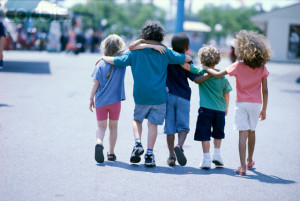In addition to working as a psychologist with children and adolescents, I teach college psychology classes. Many of my students are “nontraditional”, students who might have put off college or decided to return for a second career. Often I will hear that children today are lazy, entitled, out of control, disrespectful—and the list goes on. Have you been in a kindergarten classroom lately? I remember sitting on the “magic” red carpet singing songs and learning my alphabet while Mrs. West played the piano. Today, kids (and their teachers) work hard! They take tests and are expected to read, write, and are even introduced to very basic algebra in kindergarten. The world has become more advanced in many ways compared to when most of my college students were kids. On top of academic and social learning, kids today now have to contend with threats of violence and methods of bullying (such as cyberbullying) that we couldn’t imagine at their age. They do lockdown drills and parents have to be buzzed in to the school after showing identification.
Although officials continue to refer to school violence as isolated incidents, it is alarming how many school shootings have occurred since the violence at Columbine High School first shocked us in 1999. A search of scholarly articles in my university’s library yielded more than 1,500 articles on school violence, focused on countries around the world, not just in the U.S. School violence includes not just the mass shootings that have tragically become too common, but also bullying and fights.
Research tells us that there are many contributors to school violence, including bullying, not feeling connected to others in the school, abuse at home, and easy access to weapons. Things like “reality” television have glamorized teen pregnancy, aggression toward others, and materialism. The fact is, brains are still developing into our 20s. The images and sounds to which our children and teens are exposed, the things we value in life and reinforce in them, all combine to shape our children. In my professional and personal opinion, the problems boil down to a few important concepts:
- A sense of entitlement
- Everyday exposure to negative stimuli
- Fear of holding others accountable for their actions
- Deflection of responsibility
What can we do?
- Teach and model integrity. You have probably heard that integrity is “how you act when no one else is watching.” This is such an important life lesson. Teach your child to feel good about performing a chore, earning a goal, throwing away someone else’s trash, or completing homework for the sake of trying, not because he or she will get something. Praise effort, not just results. Teach children that we don’t always know someone else’s situation and each person should be treated with dignity
- Understand that just because you did not react more aggressively when exposed to media, technology has advanced to allow a more realistic experience, with greater involvement in the game and stimulation from sound and visual effects. Know what your kids are watching, what their music lyrics say, and limit exposure.Don’t assume that because it is a cartoon or on the radio that the messages are innocent.
- Teach empathy and acceptance of others. Children model what we do. When they see us show kindness toward others or if they see us judge and exclude others, they will do the same. Talk to them about feelings. How do you think that other person felt when that happened? How would you feel? What could you have done?
- Model sportsmanship. Teach your children to be good sports and congratulate others. At your children’s games and activities, ignore negativity from opposing teams and focus on the point of children’s activities: learning skills, being part of a team, trying your best, and most importantly—having fun! What do you want your child to remember about their childhood? Negativity begets negativity.
- Set boundaries and hold your child accountable. There is such fear of trampling on our children’s self-esteem that we sometimes avoid consequences. We learn through consequences, both positive and negative. Everyone makes bad decisions, but how we react will shape our children. Look ahead to how you want your child to behave as an adult. What message do you send if you argue with a teacher over a grade or a coach over playing time? If told your child is picking on another student and you blow this off, what lesson is your child learning? Are you teaching skills that will help the child deal with a difficult boss or coworker?
- Every child lies. My child lies, your child lies. It is a normal part of development and self-preservation. At some point you will be told your child did something and you will hear a totally different story from the child. You may have no idea what is true and we want to support our children. A good message to send is, “I understand what you are saying and I hear that you see it differently. However, the teacher is in charge and we must respect her decision.” Unless the child is in danger, it is important to teach them to respect adults and accept consequences, even if we don’t agree with the decision, and show that you will work as a team with the adults charged with helping raise your child. We can’t always get our way, and neither can the child. Show them how to handle this with grace.
- We cannot control other people, we can only control ourselves. My kids will tell you that this is my mantra. As soon as the words, “She made me…” start to come out of their mouths, my mantra comes out. She did not make you hit her; you chose to hit her when she said something mean. When children do things that we desire, such as stick up for another child, take responsibility for their actions, take a time out instead of fighting back, or admit they were wrong, praise this behavior and tell them how proud you are.
Last, but not least, give yourself a break. We will mess up and we cannot be Superparents every minute of every day. We will curse at the person who cut us off and use words like “because I said so”. If we keep our eye on the prize: raising respectful, happy, confident, responsible, caring individuals with integrity, we will help our children change the world for the better.
